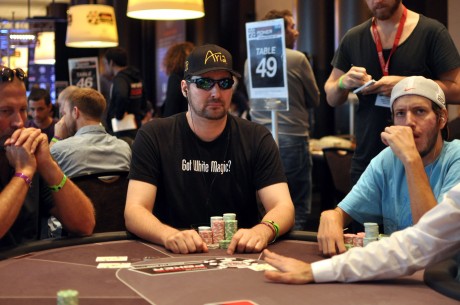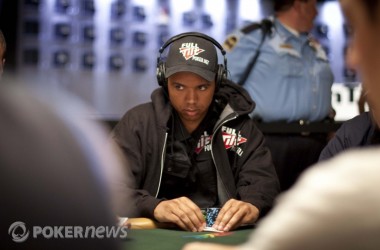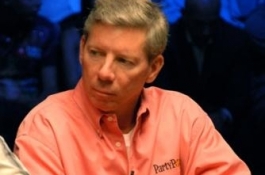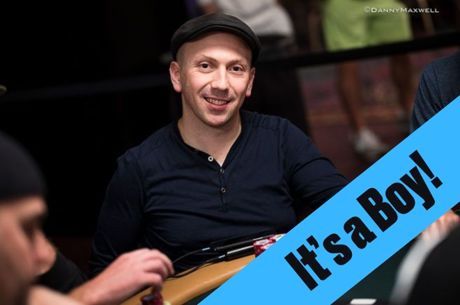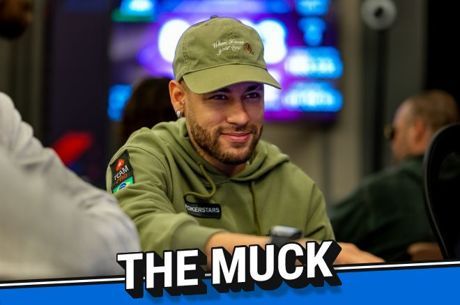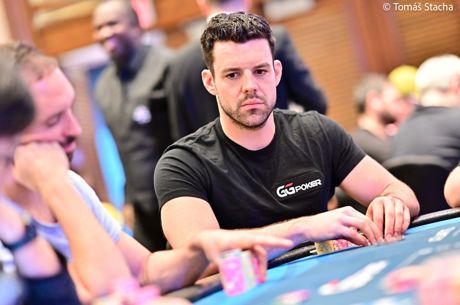Exclusive Book Excerpt: Moneymaker, Ivey, and the WSOP Hand That Changed History
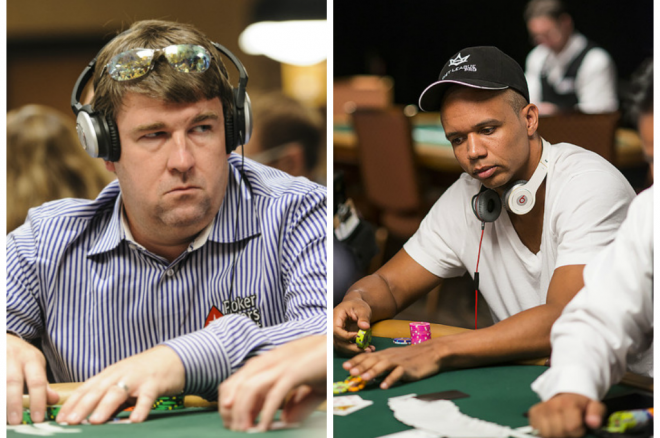
The opening “shuffle up and deal” announcement of another World Series of Poker naturally brings back a flood of memories from World Series past. And there is no WSOP for which nostalgia is stronger than the paradigm-shifting 2003 edition.
In this excerpt from Eric Raskin’s new book The Moneymaker Effect: The Inside Story of the Tournament That Forever Changed Poker, we return to Binion’s Horseshoe in downtown Las Vegas to relive a crucial Day Four hand between Chris Moneymaker and Phil Ivey that saw fortunes flip on a single card. But there’s usually more to a classic hand than just the hand itself; there’s typically some lead-up that sets the stage. So here, before we dive into the dramatic hand in question, we glimpse Moneymaker and Ivey first getting to know each other on Day Two, as well as an off-TV hand that propelled Moneymaker’s one-week transformation from dead money to legitimate threat.
Raskin’s book is written primarily in “oral history” format, with more than 30 people who were there at the Horseshoe telling the story. In addition to Moneymaker and Ivey, this selection contains interviews with poker pros Phil Hellmuth, Howard Lederer, Dan Harrington, and Barry Greenstein, as well as Tournament Director Matt Savage and 441 Productions Coordinating Producer Dave Swartz.
Chris Moneymaker: My Day Two table included Johnny Chan and Phil Ivey. I didn’t know who Phil Ivey was. He was a young black kid with a lot of chips. I mean, I saw him sit down and I was like, Oh, that’s good. He’s got a lot of chips. He doesn’t look that tough. I’m going to make those my chips. He was just Phil Ivey—he wasn’t Phil Fuckin’ Ivey at that point.
Phil Hellmuth: I don’t think anybody really knew much about Ivey at that point. In ’03, he was still young and up-and-coming. I remember he wore a basketball jersey, Houston Rockets, I think. No one really knew who he was back then. Everyone calls him the greatest player in the world now, and I don’t know if he is or he isn’t—certainly, he’s one of the two or three best on the planet—but nobody was calling Phil Ivey the greatest player in the world yet in 2003.
Phil Ivey: I really didn’t play that well. I think I was like 27 years old. I played okay, but I was still kind of learning how to play no-limit hold ’em. I had as good a chance to win as anybody, but I was just in there playing on feel.
Moneymaker: I struggled on Day Two, and my struggle was a lot more with Johnny Chan than it was with Phil Ivey. I was sitting in the seven seat, Chan was in like the two seat, and Ivey was two seats to my left, and I think Chan being two seats to his left might have slowed him down or something. Ivey didn’t really do much that day. But Chan was just abusing me.
Every time I raised, he’d come back over the top. Or he’d put me to a decision. When I was playing with a lot of the pros, I felt like they had aces every hand. Or they flopped sets every hand. I knew in the back of my mind they didn’t, but I was playing a little scared.
Some guy told me at dinner one of those nights, “You have monsters-under-the-bed syndrome. You think that your opponent always has the best hand. But they hardly ever do.”
After hearing that, it started to sink in that we all get two cards and the pros miss as many boards as I do, so I needed to stop playing fit-or-fold, which is basically what I was doing.
Ivey: Moneymaker made a little impression on me when we played together on Day Two. I remember thinking, This guy’s aggressive. We didn’t play together that long, but he played a lot of pots. He was in there dancing around and I knew he had a shot to win at that point. You’re gauging different people in a tournament who have a chance to win, and I honestly thought he was one of them.
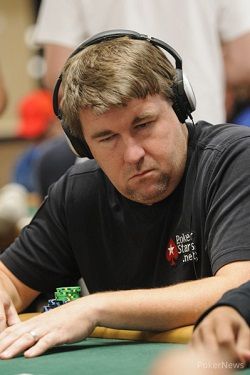
Moneymaker: The most important hand I played that you didn’t see on TV was against a guy named Chuc Hoang. I can’t remember the blinds exactly, but he raised and I called. Then we went check-check on the flop. The turn came around and I had A-3, which was complete air. He made a tiny bet, 15,000. So I decided I was going to raise 15,000. And then he came back over the top of me another 15,000.
At this point, I’m thinking, Okay, he’s got a decently strong hand, but I’m a stubborn son of a bitch and I think I can get him off of it, so I make it 100,000 more. And he calls.
At this point, I’m like, Oh, this is not really the spot I want to be in. I’ve got no outs at this point, I assume. I’ve just gotta hope for a good card on the river that doesn’t change the board too much, because I was trying to represent a made straight and I was pretty sure he had a set or two pair, something along those lines.
We were both pretty deep. I had like 300,000 more, he had like 200,000-something more—it would have hurt if I went all-in and he called.
On the river, he checked, I shoved all-in, and he folded pretty quickly.
I showed my bluff. That was strictly an emotional thing—I was so wound up and happy that I got out of this miserable trap that I put myself in and glad to have all of these chips. It was a stupid thing to show the bluff, but I was proud of myself!
And that’s when I felt like people started talking about me in a good way. Like I’m not such a fish anymore. I’m a lunatic and you might want to leave me the fuck alone.
Matt Savage: Once we got down to the final 10 players—one elimination from the final table—we moved everyone to one table. But we only had nine cameras on the table. So two people had to share. That was awkward.
Moneymaker: I was playing snug as a bug in a rug when we got down to 10. I wanted to make the final nine. I didn’t want to play another hand. I didn’t care about being the one to bust somebody.
First of all, I just wanted to go to bed. It was 4 a.m. and I was tired as hell. But I just wanted to stay out of the way. I didn’t want to get involved.
The only hand I played 10-handed was the A-Q against Ivey. If I played another hand, I don’t remember it.
Howard Lederer: Obviously, Chris Moneymaker is the big story to come out of that World Series of Poker.
But the next biggest thing that happened was the birth of Ivey. He had come close in 2002 and I remember him saying, “I’m going to win this thing in 2003,” and I said, “Yeah, yeah,” and there he was, where really he should have won that tournament. He was becoming the most intimidating tournament player in the world that year.
Moneymaker: Everybody thinks that I got lucky against Ivey. I didn’t get lucky. I raised pre-flop with A-Q, Jason Lester had tens, Phil Ivey had nines, and they both flatted. The flop was Q-Q-6.
It came around to me and I bet 75,000. Ivey only had about 475,000 left.
Everybody says I bet too small to get him out of there— my bet size kept him around—but that’s what I wanted to do. I didn’t want to run people off when I have A-Q; that would be stupid.
Jason folded his tens, Ivey called with his nines.
And I didn’t get lucky. I got very unlucky when he hit a two-outer. He hit a nine on the turn.
He checked to me, I bet 200,000, he raised 200,000 more all-in, and obviously I’m never folding there. It’s a cooler. I just got the better end of it when I hit an ace on the river.
Dan Harrington: My reaction to that ace hitting was, “Oh, good.” The money went to the right spot as far as I was concerned. That feeling was of unremitting joy.
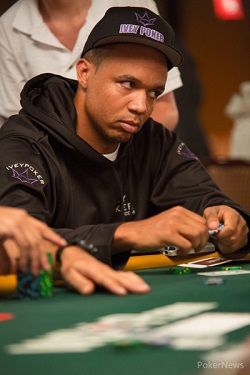
Barry Greenstein: I got a call from Phil when he had just gotten knocked out, and he says, “You won’t believe the hand I just played.”
In those days, he used to always ask me about hands, because he really wasn’t a no-limit player at that time; he was more of a seven-card stud player who was transitioning into no-limit. And he called me up and asked me about the hand, and I remember telling him I would have folded on the flop.
He said, “I almost did. And then I just had this feeling to call.”
He felt like he was the best player at the table, and part of the reason he called on the flop was that he felt he was going to make the right decision on the turn. Whether it’s to fold on the turn or call if he feels Chris is bluffing, he just felt he had a good feel for what was going on at the table. So that was his reason for calling.
Then once the nine came on the turn, the hand pretty much played itself.
Ivey: That was a very, very tough hand. I drove back east after that hand.
I believe I received $80,000. That was the payout.
But I really, really wanted to win that tournament. That was just such a tough hand. When that ace came down, I was like, Wow.
So I ended up driving back east and had a lot of time to think about it. It was a 72-hour drive back to New Jersey, because I just didn’t feel like flying. Once I got back, I was fine. I was ready to play again.
Dave Swartz: Phil Ivey was looked at as the next great poker player. If Phil had won that hand against Moneymaker, he would have been the chip leader going into the final table. You would have had the greatest player in the world as the chip leader. Instead, the cards didn’t come down that way and Moneymaker ended up knocking out the most dangerous player in the game.
I often wonder, had Ivey won that hand and gone on to win the Main Event, would everything still have happened? You still would have been talking about a young kid, cool as cool could be, winning the Main Event. But would the poker boom have still happened the same way?
I don’t know. Ivey didn’t win his way in for $39 online and his last name wasn’t Moneymaker.
Lederer: The hand where Moneymaker spikes the ace and eliminates Ivey, that might have been one of the most important hands in poker history. It led to Moneymaker winning and the whole Moneymaker Effect, but it also kept Ivey from winning the Main Event, in my opinion.
I think if that hand goes the other way, it changes history enormously.
The Moneymaker Effect is the definitive history of the 2003 World Series of Poker. It is published by Huntington Press and is available in paperback at ShopLVA.com, and as an eBook on Kindle, Nook, or the iTunes app. For more information, call 1-800-244-2224.

